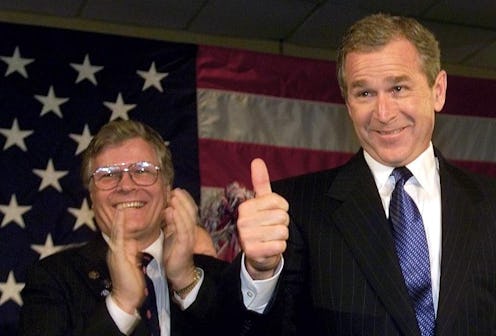News
A Popular Vote Doesn't Guarantee The Presidency
We're in the home stretch of the election, which means that the electoral map is getting more attention than ever. Hillary Clinton is favored to win by a big margin, but nothing is for certain yet, especially because the loser of the popular vote could still win the election. After all, it's happened in the past.
The winner of presidential elections is determined not by the raw vote count, but by the electoral college, and so it's possible for a candidate to win a majority of the votes cast nationwide but fail to win a majority in the electoral college — and, by extension, fail to become president.
This has happened thrice* in America's history: In 1876, 1888, and 2000. The circumstances were different each time, but the result was the same: The candidate who won the popular vote didn't win the electoral college, and a candidate who didn't win the popular vote became president. Needless to say, these were all highly, highly controversial elections.
All of this raises the obvious question: Why doesn't America get rid of the electoral college and choose its presidents by a simple popular vote?
The answer is very complicated, and the full history of the electoral college is beyond the scope of this article. But the long and short of it is that switching to a popular vote-based election would require a Constitutional amendment, and there isn't anywhere near enough support amongst states to enact such an amendment — nor, in all likelihood, will there ever be.
The electoral college system is based on the idea that each state is an individual voting entity itself, not just a collection of people who cast their own votes. From this perspective, the idea of picking presidents through a national popular vote seems unfair: It would mean that states with small populations, like New Hampshire or Montana, would receive only a fraction of the voting power as places like California or New York, which have exponentially bigger populations.
The electoral college attempts to rectify this by creating a system wherein small states are worth disproportionately more electoral votes than larger states. For example, California has 55 electoral votes and a population of 39 million people; this comes out to one electoral vote for every 709,000 Californians. Montana, by contrast, has three electoral votes but a population of just 584,000, or one electoral vote for every 195,000 people.
In this way, the electoral college makes the votes of people in small states more valuable, on an electoral vote basis, than the votes of people in large states. And that's why the system will never be eliminated: a Constitutional amendment requires ratification from a majority of states, and there are more small states than larger ones in America. Why would senators and legislators in small states want to give up their artificially-increased voting power? They wouldn't, so the system, for all intents and purposes, is locked in.
It's worth noting that in practice, the electoral college doesn't necessarily empower small states over big ones; no candidates are campaigning vigorously in Montana this year, for example. What the system really does is empower swing states — that is, states that are roughly evenly-divided between Republicans and Democrats. The best example of this is Florida, one of the most crucial swing states in the country. It has one of the largest populations in the country and regularly receives more attention from candidates than just about anywhere else.
Let none of this hide the fact, however, that the electoral college is sometimes perceived as a flagrantly undemocratic system, as it weights the votes of some Americans more than others. It may be locked into place, but that doesn't mean it's an effective or fair system — the fact that three presidents have been "elected" without winning the popular vote is pretty solid proof of this.
*The 1824 election is a potential fourth example, but the popular vote wasn't recorded in some states at that time, so it's impossible to say for sure.
